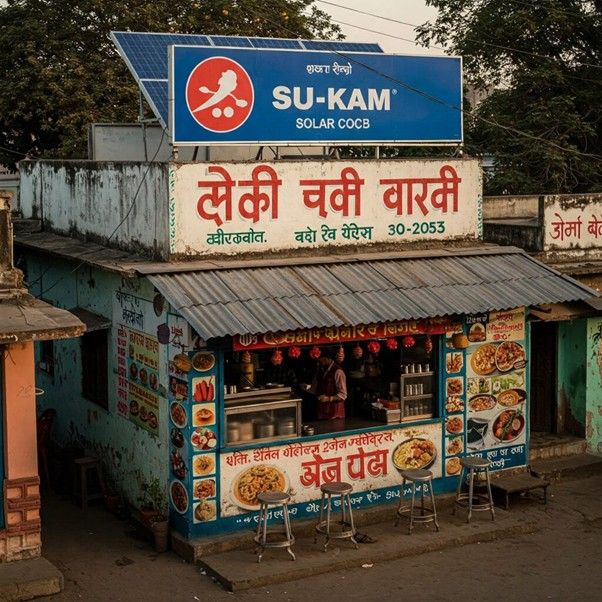The Dhaba Visionary: Remembering Kunwer Sachdev, the Unconventional Marketing Genius
It's hard to believe it's been some years since we lost Kunwer Sachdev, the founder of Su-Kam Power Systems. While the world remembers him for his pioneering work in the power solutions industry, I carry a unique set of memories – those of a colleague who witnessed firsthand his unconventional, yet incredibly effective, marketing genius. And it all started on the dusty shoulders of India's iconic Grand Trunk Road.
I vividly recall those days when our team would travel with Mr. Sachdev. He had a peculiar preference: Dhabas, the humble roadside eateries, over any fancy restaurant. For us, his team, there was no debate – where he stopped, we stopped. It was during one such journey to Ambala, on a typical bustling Dhaba, that I witnessed the spark of an idea that would forever change the landscape of rural branding in India.
As we savored the simple yet delicious food, Mr. Sachdev struck up a conversation with the Dhaba owner. He was always inquisitive, always observing. That day, his gaze fell upon the blank spaces above the Dhaba. And then, it struck him.
"Why not put up our Su-Kam boards here?" he mused aloud, more to himself than anyone else. The idea was simple, almost ridiculously so. Install Su-Kam hoardings on the roofs or facades of these Dhabas, with the name of the eatery neatly printed below.
The marketing head, who was also part of our travel entourage, received immediate instructions. "Get these boards designed and installed. Send me the photos. Get the Dhaba owner's number, I'll follow up." There was no hesitation, no lengthy market research. Just pure, unadulterated intuition.
Initially, we were skeptical. Spending a significant chunk of the marketing budget on what seemed like random Dhaba signboards felt… wrong. We were a team of professionals, armed with marketing jargon and conventional strategies. This felt like a detour, an unnecessary expense. The boards themselves were simple – the prominent Su-Kam logo and branding, with the Dhaba's name almost as an afterthought underneath.
But Mr. Sachdev saw something we didn't. He understood the pulse of the nation, the vast reach of these unassuming roadside establishments. He recognized that these Dhaba's were not just places to eat; they were hubs, meeting points for travelers, truckers, and locals alike. They were prime, untapped real estate for brand visibility.
As the first few boards went up, a sense of quiet anticipation filled the air. Mr. Sachdev meticulously followed up with the Dhaba owners, ensuring the installations were done correctly. With the success of the initial few, his conviction solidified. He scaled the operation, blanketing the highways and byways of India with these Su-Kam-branded Dhaba's.
Slowly, almost imperceptibly, the impact began to show. The Su-Kam brand started becoming synonymous with reliability, a familiar sight on every journey. The cost? Minimal, especially compared to traditional advertising campaigns. This "insane" idea, as some of us privately labeled it, was proving to be a stroke of genius, delivering unparalleled brand recall at an unbelievably low cost.

The irony, as we realized years later, was profound. The very Dhabas that initially provided a cost-effective branding solution eventually became savvy to their value. As more and more companies recognized the effectiveness of this strategy, Dhaba owners started charging hefty premiums for the coveted space on their rooftops. Mr. Sachdev, in his unassuming way, had inadvertently created a new advertising medium.
Kunwer Sachdev wasn't armed with an MBA or fancy marketing degrees. His education came from observing life, understanding the common man, and possessing an innate ability to connect with the grassroots. His Dhaba signboard strategy stands as a testament to his unconventional thinking, his courage to defy conventional wisdom, and his profound understanding of the Indian landscape.
Working alongside him during those formative years was an eye-opening experience. It taught me that true innovation often lies outside the confines of textbooks and boardrooms. It resides in the simple act of observing, connecting the dots, and having the audacity to act on an unconventional idea.
Mr. Sachdev's legacy extends far beyond the power industry. For those of us who witnessed the "Dhaba revolution" firsthand, he will always be remembered as the visionary who saw branding potential where no one else did, a true marketing maverick who taught us that sometimes, the most brilliant ideas are found not in strategy meetings, but on the dusty roads of India, over a simple plate of dal and roti.